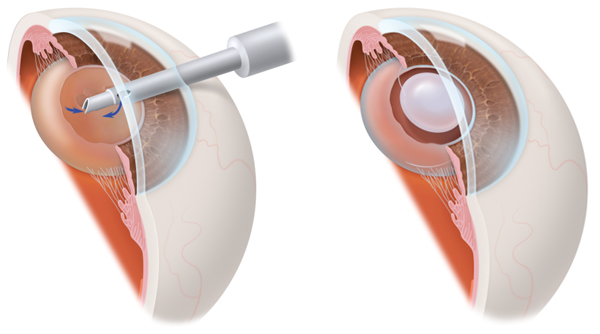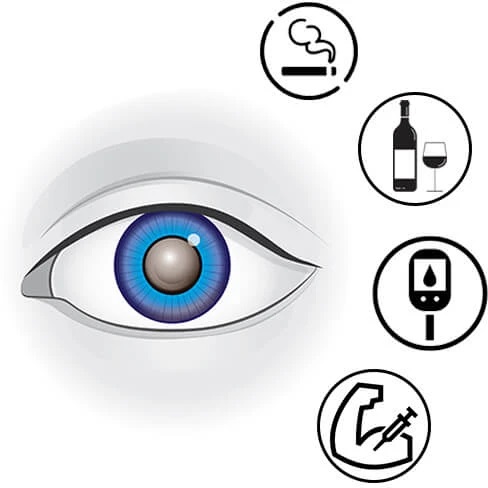Planning For
Cataract Surgery? Don`t Panic!
Any surgery carries some risk, and cataract surgery is no different. As far as surgeries go, cataract surgery is very low-risk. A small percentage of patients will experience complications.

NEVER LET CATARACT BLUR YOUR HAPPINESS
What Happens in Cataract
Cataract occurs when the natural clear lens in your eyes starts turning opaque and reduces the amount of light being transmitted to the back of the eyes. It is commonly observed in aging eyes over a period of time and in some cases it can happen rapidly due to injury or inflammation. The clouding of this clear lens causes the hazy and foggy vision that is seen in a patient with cataract.
You may experience a gradual drop in the quality of your vision as the Cataract progresses. This bad vision gradually impacts even your day to day routines and can make you feel frustrated. You may also miss out on enjoying your hobbies and pursuing your passions
HOW DO I KNOW IF I HAVE CATARACTS?
Symptoms
If you have Cataract, you may observe






Causes Of Cataract
Age is one of the major contributors to the progress of Cataract in your eyes. Due to advancing age, the transparency of the clear lens starts to decrease gradually, slowly progressing to form a Cloudy Cataract.
Along with age, there are some other causes that act as an accelerator to the clouding of eyes. Check out these other causes influencing your clouded vision,
 Smoking
Smoking Alcohol Consumption
Alcohol Consumption Diabetes
Diabetes Usage of certain medications such as steroids
Usage of certain medications such as steroids
Medical
Every life matters, we do care for our patients
MODERN CATARACT SURGERY
safer, gentler, and highly customizable. Quite simply, this is the best technology in the world.
Choose The Best
Surgical Technique
We prefer best technique to get a best result
Are You Stuck
Which lens is best for you
There are a lot of option for Intra ocular lens. Choose the best lens which delivers the best visual outcomes.
- WHAT TO EXPECT
MODERN CATARCT: START TO FINISH
COMPREHENSIVE EXAM
A comprehensive, dilated examination is the only way to know which vision-correction procedure is best for you. While your exam involves comprehensive diagnostic testing, it is also our opportunity to learn more about you, your expectations, and your lifestyle. All of these factors play an important role in recommending the best procedure for you:
The complete exam can take up to 90 minutes. After all the data is collected, our doctor will examine you, discuss the treatment recommendation, discuss various lens implant options that may eliminate glasses after cataract surgery, and answer all your questions. Your visit will include dilation of your pupils, which will affect your eyesight for about 4-6 hours, as you may have experienced with a routine eye exam.
BEFORE PROCEDURE
Depending on your pre-operative vision and desired visual result, your doctor may recommend a tailored treatment plan that could include creating ultra-precise laser incisions in the cornea and a specific clear lens type, such as a multi-focal lens. This tailored treatment may reduce your need for glasses or contacts after surgery.
Your doctor will also prescribe anti-inflammatory and antibiotic eye drops that reduce swelling and the risk of infection. We’ll provide specific instructions on how to use them after surgery. Depending on your location, your surgery will be performed in either a hospital or an outpatient surgery center. When you arrive, you will be checked in and asked to sign an informed consent document. You will be taken to a room and given drops to prepare your eye for the surgery. You will be given an IV with medicine that will help you relax. Most people feel sleepy during the procedure.
DAY OF PROCEDURE
After your surgery, you will spend a short period of time resting in the outpatient recovery area before you are ready to be driven home. You should expect to have blurry vision and mild soreness after the procedure, but you will be able to see your doctor the very next day at your centre location.
Depending on your pre-operative vision and desired visual result, your doctor may recommend a tailored treatment plan that could include creating ultra-precise laser incisions in the cornea and a specific clear lens type, such as a multi-focal lens. This tailored treatment may reduce your need for glasses or contacts after surgery.
POST-PROCEDURE
Immediately following the procedure, you will notice a change in your vision. It’s always foggy at first, but most people can see well enough to read a clock from across the room. Your eyes will be numb for 15-25 minutes; then they will start to water and burn. After LASIK, this discomfort usually lasts 4-5 hours. To help with the burning, we supply you with “comfort drops” that have numbing medicine and artificial tears in them. After being driven home, place a cool compress on your eyelids to relieve any discomfort. Try to sleep or rest with your eyes closed. You may resume normal activities the same or following day. You can lift and exercise, but do not rub your eyes. Your vision may still be foggy; this is a normal part of your healing process and will clear in the days and weeks following the procedure. Most people see well enough to work the next day.

